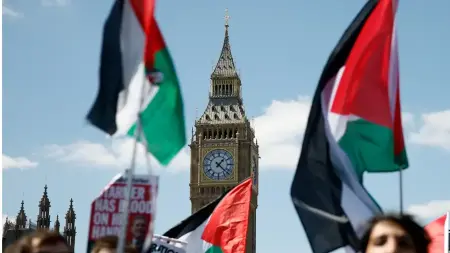September 23, 2025
The UK has formally recognised the State of Palestine, joining countries like Canada, Australia, and Portugal. This move marks a historic shift in UK foreign policy amid ongoing Middle East tensions.

In a historic and highly significant foreign policy decision, the United Kingdom has formally recognised the State of Palestine, joining other nations such as Canada, Australia, and Portugal in this diplomatic milestone. The announcement, made yesterday by the UK Foreign Secretary, signals a major shift in Britain’s approach to the Israeli-Palestinian conflict and carries far-reaching implications for international relations in the Middle East.
The decision follows decades of diplomatic uncertainty over the status of Palestine. While the UK has long supported a two-state solution, previous administrations had refrained from formal recognition, instead engaging primarily in mediation efforts and humanitarian aid. This recognition marks the first time the UK has explicitly acknowledged Palestine as a sovereign entity, reflecting changes in both domestic and international political pressures.
Officials from the Foreign Office stated that the recognition aligns with the UK’s commitment to a fair and sustainable resolution to the Israeli-Palestinian conflict. By formally recognising Palestine, the UK aims to bolster peace negotiations, encourage stability in the region, and support the Palestinian Authority in building robust governmental and institutional structures. Advocates for the move argue that such recognition is a necessary step toward achieving lasting peace and equality for Palestinians after decades of conflict, displacement, and economic hardship.
The announcement has sparked immediate reactions from the international community. Countries such as Canada, Australia, and Portugal have already recognized Palestine in recent years, citing similar diplomatic and moral grounds. The UK’s entry into this group is expected to influence other Western nations, potentially encouraging additional recognitions. Some analysts believe this could reshape diplomatic dynamics in the Middle East, affecting ongoing negotiations, economic agreements, and security arrangements in the region.
However, the decision has also drawn criticism. Israeli officials expressed concern over the UK’s move, suggesting it could undermine ongoing peace talks and heighten tensions between the two states. Domestic opposition parties and commentators in the UK have debated whether the timing of the recognition was politically motivated, reflecting broader geopolitical shifts or domestic pressures ahead of upcoming elections. Critics warn that without a comprehensive peace agreement in place, recognition alone may not produce meaningful progress on the ground.
Human rights organizations, Palestinian advocacy groups, and international observers have largely welcomed the recognition, describing it as a long-overdue acknowledgment of Palestinian statehood and sovereignty. They argue that formal recognition is essential not only for diplomatic purposes but also for the protection of human rights, the provision of aid, and the establishment of fair legal frameworks in Palestinian territories.
From a strategic standpoint, the UK’s recognition may facilitate greater international cooperation on economic and developmental projects in Palestine. Analysts suggest that this could open doors for UK businesses, NGOs, and educational institutions to engage more directly with Palestinian authorities, fostering investment, infrastructure development, and social programs. Over the long term, these measures may contribute to improved living standards, stronger governance, and more stable civil institutions within Palestine.
The recognition comes amid heightened tensions in the Middle East, including ongoing disputes over settlements, border conflicts, and refugee rights. Experts caution that while diplomatic recognition is a symbolic and substantive gesture, it will require careful handling, negotiation, and follow-up measures to translate into tangible improvements for Palestinian citizens and long-term regional stability.
In conclusion, the UK’s formal recognition of the State of Palestine represents a pivotal moment in both British foreign policy and international relations. While it is expected to strengthen diplomatic ties with Palestinian authorities and support the pursuit of peace, it also poses challenges in managing regional tensions and balancing alliances. The coming months will be critical in determining how this recognition influences both the political landscape in the Middle East and the UK’s role as a global diplomatic actor.